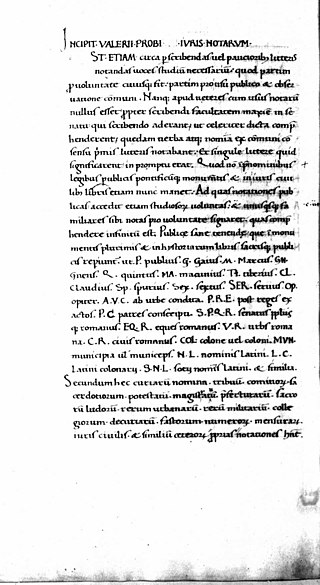Related Research Articles

Gaius Suetonius Tranquillus, commonly referred to as Suetonius, was a Roman historian who wrote during the early Imperial era of the Roman Empire. His most important surviving work is a set of biographies of 12 successive Roman rulers from Julius Caesar to Domitian, properly titled De vita Caesarum. Other works by Suetonius concerned the daily life of Rome, politics, oratory, and the lives of famous writers, including poets, historians, and grammarians. A few of these books have partially survived, but many have been lost.

Classical Latin is the form of Literary Latin recognized as a literary standard by writers of the late Roman Republic and early Roman Empire. It was used from 75 BC to the 3rd century AD, when it developed into Late Latin. In some later periods, it was regarded as good or proper Latin, with following versions viewed as debased, degenerate, or corrupted. The word Latin is now understood by default to mean "Classical Latin"; for example, modern Latin textbooks almost exclusively teach Classical Latin.
Lycophron was a Hellenistic Greek tragic poet, grammarian, and commentator on comedy, to whom the poem Alexandra is attributed.

Marcus Valerius Probus, also known as M. Valerius Probus Berytius or Probus the Berytian, was a Roman grammarian and critic, who flourished during Nero's reign.
Zenodotus was a Greek grammarian, literary critic, Homeric scholar, and the first librarian of the Library of Alexandria. A native of Ephesus and a pupil of Philitas of Cos, he lived during the reigns of the first two Ptolemies, and was at the height of his reputation about 280 BC.
Rhianus was a Greek poet and grammarian, a native of Crete, friend and contemporary of Eratosthenes.
Apollodorus of Athens son of Asclepiades, was a Greek scholar, historian, and grammarian. He was a pupil of Diogenes of Babylon, Panaetius the Stoic, and the grammarian Aristarchus of Samothrace, under whom he appears to have studied together with his contemporary Dionysius Thrax. He left Alexandria around 146 BC, most likely for Pergamon, and eventually settled in Athens.

Dunash ha-Levi ben Labrat was a medieval Jewish commentator, poet, and grammarian of the Golden age of Jewish culture in Spain. He is known for his philological commentary, Teshuvot Dunash, and for his liturgical poems D'ror Yiqra and D'vai Haser.

Lucius Orbilius Pupillus was a Latin grammarian of the 1st century BC, who taught at school, first at Benevento and then at Rome, where the poet Horace was one of his pupils. Horace criticizes his old schoolmaster and describes him as plagosus, and Orbilius has become proverbial as a disciplinarian pedagogue.
Parthenius of Nicaea or Myrlea in Bithynia was a Greek grammarian and poet. According to the Suda, he was the son of Heraclides and Eudora, or according to Hermippus of Berytus, his mother's name was Tetha. He was taken prisoner by Helvius Cinna in the Mithridatic Wars and carried to Rome in 72 BC. He subsequently visited Neapolis, where he taught Greek to Virgil, according to Macrobius. Parthenius is said to have lived until the accession of Tiberius in 14 AD.
Chorizontes ("separators") was the name given to the ancient Alexandrian critics who believed the Iliad and Odyssey were by different poets. The best known of them were the grammarians Xenon and Hellanicus, but they are nonetheless extremely obscure figures about whom nothing else is known. Aristarchus of Samothrace was one of their opponents.
Rabbi Yitzhak ben Barun ben Yosef Benveniste, also known by his Arabic name Abū Ibrahīm Iṣḥāq ibn Barūn was an 11th-century Spanish grammarian of Arabic and Hebrew, mainly known for his influential book entitled The Book of Comparison between the Hebrew and the Arabic Languages, in which he traces parallels between hundreds of Arabic and Hebrew words. He was a pupil of Rabbi Levi ibn Altabban. He was highly revered by his friends and successors, the Hebrew poets and grammarians Moses ibn Ezra and Judah Halevi, who had both written poems in his honour.

William Owen Pughe was a Welsh antiquarian and grammarian best known for his Welsh and English Dictionary, published in 1803, but also known for his grammar books and "Pughisms" (neologisms).
Homer of Byzantium was an ancient Greek grammarian and tragic poet. He was also called ho Neoteros, to distinguish him from the older Homer.
Ibn Amira (1186- 1258/60), full name: Abū al-Muṭarrif Aḥmad bin Abdallāh bin al-Ḥusayn bin Aḥmad Ibn Amīra al-Makhzūmī was a historian, poet, and scholar of law from al-Andalus during the reign of the Almohad Caliphate. Ibn Amira was Qadi of Mallorca and worked for the Almohad sultan in Valencia and Seville. He moved to Morocco in 1239/40 and continued to work for the sultan there.
In the Greco-Roman world, the grammarian was responsible for the second stage in the traditional education system, after a boy had learned his basic Greek and Latin. The job of the grammarian was to teach the ancient poets such as Homer and Virgil, and the correct way of speaking before a boy moved on to study under the rhetor. Despite often humble origins, some grammarians went on to achieve elevated positions in Rome, though few enjoyed financial success.
Antonius Rufus was a Latin grammarian who was quoted by the rhetorician Quintilian and the grammarian Velius Longus. The scholiast on Horace who was historically called Cruquianus speaks of an Antonius Rufus who wrote plays both praetextatae and togatae, but whether he is the same as the grammarian is uncertain. This reference is considered by some scholars altogether unreliable.
References
- G. J. Williams and E. J. Jones, eds., 'Gramadegau'r penceirddiaid', Caerdydd, 1934